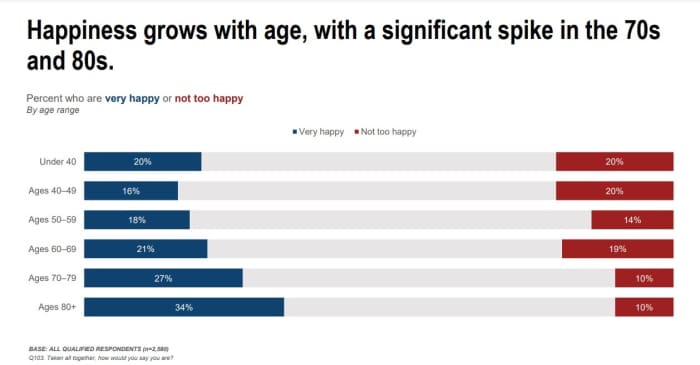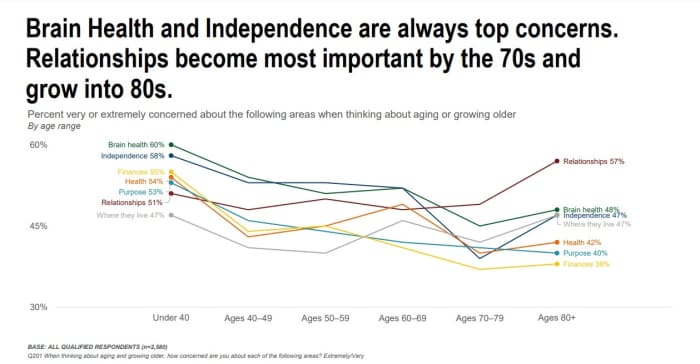This post was originally published on this site
I’m writing this unretirement column three days after turning 66 (and four months before reaching my Social Security “Full Retirement Age”). So, my 70s are just around the corner. Until recently, that gave me pause.
But after seeing what people in their 70s said in the recent AARP/National Geographic “Second Half of Life Study” and interviewing seven experts on aging — four between 70 and 81 — I’m now looking forward to my next decade.
After reading what I learned, I think you might become more enthusiastic about prospects for your 70s, too. (A few of today’s celebrity septuagenarians: Jeff Goldblum, Mick Jagger, Dolly Parton, Helen Mirren and Bruce Springsteen.)
‘A kind of golden decade’
“You could really say the 70s are kind of a golden decade right now,” said Neil Wertheimer, the 60-something editor of AARP’s article about its survey of 2,580 U.S. adults who also helped shape its questions.
When asked to imagine their quality of life as a ladder with 10 steps, people in their 70s told AARP and National Geographic they were standing on a higher step than what those of all younger ages said.
The level of happiness and optimism of respondents in their 70s “was far higher than we expected,” Wertheimer told me.
Happiness now spikes in your 70s, generally speaking, according to the survey: 90% of respondents in their 70s said they were happy, compared with 81% in their 60s and 80% in their 40s.

AARP
“What this said to us was ‘My life right now is very good and I’m not expecting it, and the world, to get better necessarily. But I don’t need it to because I found my peace, I found my sense of purpose and I have learned to live within my means,’” Wertheimer says.
Some 51% of those surveyed in their 70s were optimistic about their future.
“The key surprise is that older people have remained doggedly optimistic, even post-COVID,” says “The Super Age” author Bradley Schurman.
Your 70s: The Generation X of decades
And yet, despite all this happiness and optimism, I’d call our 70s the Generation X of decades — frequently overlooked.
These 10 years get far less attention than either our 60s, when retirement often starts and Medicare and Social Security kick in, or our 80s, generally seen as when problems of frailty, mobility and cognition arise.
“Our 70s are a time period that has been, in some ways, underemphasized.” says Karl Pillemer, the Cornell University gerontologist, 67, who’s author of “30 Lessons for Living” and has led The Legacy Project, collecting life lessons of people 65+.
Helen Dennis, the 81-year-old writer of the Successful Aging syndicated column jokes that the decade of your 70s “gets you from 60 to 80, like the highway in between.”
Notes Pillemer: “Because society is so ageist, people envision life after 70 to be this kind of Dickensian horror. And we heard over and over [in Legacy Project interviews] that it turns out, for most, to be much better—it’s an extraordinary surprise. It’s a potentially, really rich time in the life course.”
Maybe it’s time for our 70s to get some love.
Read: These are the Best New Ideas in Retirement
Recognizing what’s of value in life
Paul Irving, a Milken Institute Senior Fellow and former Chairman of the Milken Institute Center for the Future of Aging, calls our 70s “this wonderful little window in which we really recognize, more than any other time in life, what’s important — what’s really of value.”
Irving, the author of “The Upside of Aging” who recently turned 70, notes: “I think I have a different, and frankly more sophisticated and nuanced ability [than when I was younger] to see through challenges and understand the range of solutions that can be brought to bear and not be intimidated by the complexities of work or the complexities of life. I don’t think I’m unusual in that regard.”
Pillemer says our 70s is an important time “for people to engage in experiences they want to remember, and lay the groundwork for the rest of the last third of their life.”
A period of regeneration when you make the effort
Dennis believes your 70s can be a period of regeneration and opportunity, if you make it so (as she did).
In her 70s, Dennis told herself, “I need to be engaged in things that I feel are important, with what I call ‘good people,’ ‘interesting people,’ people doing good work.”
For her, that included leading a retreat for the board of a convent.
“I think the way to be fulfilled is, rather than trying to seek happiness by saying, ‘How can I spend my money for a trip to the Caribbean and what can I buy myself?,’ it’s better to think, ‘What can I do for other people?’” says Douglas Kenrick, 74, an Arizona State University evolutionary social psychology professor currently on sabbatical.
Americans in their 70s often decide, “they want to engage in activities that may create a better future that they themselves won’t live to see,” Pillemer says.
In the words of the Greek proverb Encore.org Co-CEO Marc Freedman likes to quote: “Society grows great when older people plant trees under whose shade they shall never sit.”
Happy with their relationships
The AARP/National Geographic survey found that Americans in their 70s were especially pleased with their relationships with friends and family; 81% rated those relationships excellent or very good. Just 69% of those in their 60s felt that way.
The ponytailed Kenrick told me: “Now, most of my happiness and fulfillment depends on how my two sons and grandkids are doing.” He and his son David just published the book, “Solving Modern Problems With a Stone-Age Brain.”
But the number of relationships people in their 70s have has diminished over the years, according to the AARP/National Geographic survey.
“Making meaningful relationships later in life become more difficult,” says Schurman. “It stands to reason, because older populations are more likely to experience the loss of friends and the tightening of their circle over time.”
Wertheimer agrees, saying many work relationships are transitory and transactional. In your 70s, relationships are often what he calls “more authentic.”
Concerns about health prospects
The clouds that hang over the heads of people in their 70s, according to the survey: fears about their future health.
They’re worried about prospects for diminished hearing, heart health, stamina, bowel and bladder control, the risk for cancer and autoimmune disorders, and issues around mobility and cognition. Dementia risk, Pillemer notes, rises from 5% at 65 to 17% for people 75 to 84.

AARP
In a 2020 YouTube video, Age Wave consulting firm founder and CEO Ken Dychtwald reflected on what it was like for him to turn 70: “I have to say, physically, it’s been a bit of a descent. I worry about the slope of that descent becoming more steep.” But emotionally and spiritually, the author of the new book, “Sages of Aging,” said: “I feel like it’s been a nice kind of ascent.”
The advice from aging experts in their 70s and 80s is to do all you can to stay as healthy as you can.
“During the pandemic, I saw two people,” says Dennis. “My daughter and my fitness coach once a week.” She likes to cite geriatrician Walter Bortz’s line: Disease in old age is not the enemy; it’s frailty.
Says Dennis: “I want to push frailty out to 100.”
To keep fit, Kenrick takes long bike rides and walked 10 miles shortly after his last birthday. Irving told me: “When you and I are done talking, I’m getting on my exercise bike and I’m going to do 10 miles.”
In his interviews with older Americans, Pillemer says, “I heard over and over someone who started as a tennis player becomes a pickleball player; a hiker becomes a walker. People who age successfully in their 70s optimize what they can.”
The boomer attitude hits 70+
Wertheimer thinks the upbeat attitudes of many people in their early- to mid-70s are partly because they’re boomers. It’s the way they’ve lived their adult lives, he believes.
“Their sense of exploration, of hope, of curiosity — I think those are traits that stay with you for life. And I absolutely believe that’s influencing their mind-sets,” he says.
“I see it anecdotally all around me,” Wertheimer adds. “The number of people in their 70s who are going on road trips to go to museums rather than just resorts? They’re learning; they’re curious. They want to try new things. I do think the seeds of being boomers in their youth — those don’t go away. And if they can apply that in their 70s, that’s a beautiful thing.”
The ’U List’ — worth watching
From time to time, I like to point readers to movies and TV shows dealing with retirement or older adults and there are two worth mentioning now because we all could use a few laughs.
The new comedy film “Jerry and Marge Go Large,” starring Bryan Cranston and Annette Bening and streaming on Paramount+, tells the real-life story of retirees Jerry and Marge Selbee who figure out a way to win the lottery and revive their Michigan town with the proceeds. My favorite parts are when Cranston’s character finds himself newly retired from his job as an automotive production line manager and needs to find a way to spend his newfound free time with his wife — a transition that’s often difficult.
And, just for fun, I’d suggest giving the new ABC game show “Generation Gap” a try; it’s on Thursdays at 9 ET/8 CT. Generation Gap pits a grandparent/grandchild team against a similar one. Host Kelly Ripa asks the older contestants pop culture questions about the world of Gen Z and the younger ones about people, places and things beloved by boomers.

